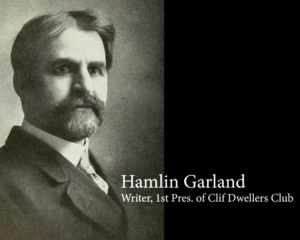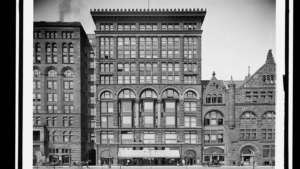Remarks of William J. Bowe
Representing The Cliff Dwellers at the Induction of Hamlin Garland
into the Chicago Literary Hall of Fame
Chicago History Museum
April 16, 2024
 Not long after 32-year-old Hamlin Garland arrived in Chicago in 1892, he had met and married the sister of the great sculptor Lorado Taft. As time went on, he began socializing with the sculptor and other artists and architects above Taft’s studio in the so called “Little Room” of The Fine Arts Building downtown.
Not long after 32-year-old Hamlin Garland arrived in Chicago in 1892, he had met and married the sister of the great sculptor Lorado Taft. As time went on, he began socializing with the sculptor and other artists and architects above Taft’s studio in the so called “Little Room” of The Fine Arts Building downtown.

Fine Arts Building, 410 South Michigan Avenue
In the cultural aftermath of the World’s Columbian Exposition, Garland had come to believe that it was time for Chicago to have a more formal social group dedicated to the arts. With Garland leading the organizing effort, the “Attic” men’s club was born in 1907. Two years later, the Club was renamed “The Cliff Dwellers” and it moved into the top two floors of the new Orchestra Hall building.
Women had become an important part of The Cliff Dwellers by the time the Club lost its lease atop Orchestra Hall in 1996. The fortuitous upshot of this event was the opportunity for the Club to move next door to the north into the 22nd floor penthouse and terrace space it now occupies at 200 South Michigan Avenue, directly across from The Art Institute of Chicago’s lions.

View from The Cliff Dwellers terrace
The move’s biggest gift was that the Club could leave behind a limited view of Grant Park treetops and gain an expansive and spectacular view of Lake Michigan that stretches from Millennium Park on the north, past Monroe Street Harbor, Buckingham Fountain, and the Museum Campus, all the way to the Indiana steel mills on the south.
Back on the first anniversary of the Club’s Orchestra Hall tenancy, Garland had written a short verse to celebrate the gift to the Club of an exquisite silver punch bowl crafted by the Robert Jarvie. Garland’s poem accurately describes the Club then and now as an oasis of calm, and a place where artistic appreciation and good fellowship still prevail adjacent to the competitive commercial life of the great city that lies just outside the Club’s doors.
Here is Garland’s 1910 Verse:
Warriors are we, but in another fashion.
Rivals for wealth and happiness and fame,
down in the city’s deeps we meet in savage fashion,
and play as best we may the selfish, sordid game.
But here, at peace, before these glowing embers,
meeting this ample bowl’s hospitable design,
man greets his fellow man, and only then remembers,
Art’s magic bond of light, and beauty, bloodless shrine.
Readings from Hamlin Garland’s novel Rose of Dutcher’s Coolly)
Chapter XV – Chicago
Somewhere just ahead it sat, this mighty hive of a million and a half of people. The thought of it made her heart beat quick, and her throat filled. She was going there; the lake was there; art was there, and music and the drama—and love! Always under each emotion, always behind every success, was the understanding that love was to be the woman’s reward and recompense. It was not articulate nor feverish, this thought; it was a deep, pure emotion, streaming always toward the unknown. She dreamed as the train rumbled on. She would succeed, she must succeed. She gripped the seat-rail with her broad, strong hands, and braced herself like one entering a flood.
It was this wonderful thing again, a fresh, young and powerful soul rushing to a great city, a shining atom of steel obeying the magnet, a clear rivulet from the hills hurrying to the sea. On every train at that same hour, from every direction, others, like her, were entering on the same search to the same end.
“See that cloud?” someone said, “that’s Chicago.”
Chapter XVI – A Fresh Conquest
A fresh, keen east wind had arisen, pure and exhilarating, and the smooth expanse of glittering green-and-blue water stretched out under a vivid blue sky, in which great clouds floated like snow mountains, trailing great shadows like robes of state upon the lake. The curving lake-wall was wet and glistening with the up-flung spray…The girl felt her soul grow larger as she faced this scene, so strange, so oriental, and she looked and looked, until it became a part of her.
Chapter XVII – Her First Dinner Out
Rose went to see the parts of the city which no true Chicagoan ever visits. That is to say, she spent Sunday in the park, admiring with pathetic fortitude the sward, the curving drives, and the bridges and the statues, in company with the lowly and nameless multitude—she even crowded in to see the animals.
Around her streamed floods of the city’s newly acquired residents, clerks, bookkeepers, type writers, shop girls, butcher’s boys, salesmen, all fresh from the small towns and from the farms of the West.
About William J. Bowe:
Born and raised in Chicago, William J. Bowe attended the Latin School here and received his college degree from Yale University. After graduating from the University of Chicago Law School, Bill enlisted in the Army and served in its Intelligence Branch between 1968 and 1971. After his discharge from the Army, Bill returned to Chicago and the practice of law. After leaving private practice in 1979, Bill embarked on a long career as general counsel for several businesses, including one owned by a director active in the newly functional MacArthur Foundation, the newswire service United Press International, and Encyclopaedia Britannica. In his 28 years as Britannica’s Executive Vice-president and General Counsel, Bill helped transition the 250-year-old print reference publisher to its vastly expanded future as an internet-based publisher. Bill’s book, Riots & Rockets, recently published on Amazon, carries an account of his Army experience as well as his later political and legal career. Besides being an author, Bill shares another commonality with honoree Hamlin Garland. Garland served as the first President of The Cliff Dwellers arts club, and Bill was the club’s 37th President.
[Video courtesy of Rana Segal, Ravensvoyage Productions, and Don Evans, Chicago Literary Hall of Fame]









